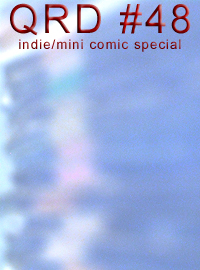
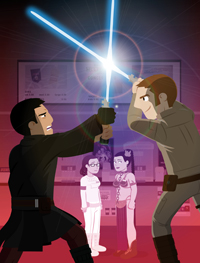
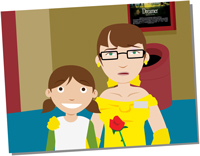
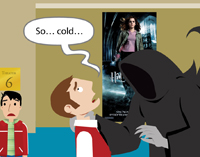
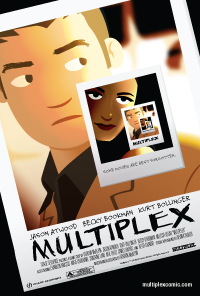

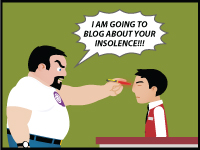



February 2011
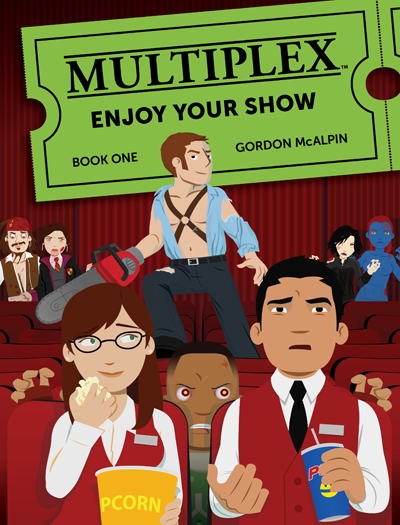
City: Chicago, IL
Comics: Multiplex / Multiplex: Enjoy Your Show
Websites: multiplexcomic.com / multiplexcomic.com/enjoyyourshow
QRD – How old were you when you first got into comics & did you always stick with them or did you come back to them?
Gordon – I got into comics kind of backwards: I was always a big fan of superhero cartoons, particularly the DC characters, so I was a big fan of Superfriends & Super Powers & all that. I also played a little D&D & got interested in Mayfair Games’ DC Heroes RPG, which lead me to the Crisis on Infinite Earths “maxi-series,” & I got hooked. I started reading a lot of the post-Crisis comics, like the George Perez Wonder Woman, the Paris Cullins Blue Beetle, Byrne’s Superman stuff, Justice League… It was a great time for DC. I always stuck with comics, although my tastes have broadened a lot. I read more indie stuff than mainstream stuff & more graphic novels/trades than monthlies, but every now & then a good team on a superhero book will lure me back.
QRD – What was the first comic book you ever bought?
Gordon – I know I had a few random comics, but the first one I remember specifically seeking out was Crisis on Infinite Earths #1.
QRD – How old were you when you put out your first comic?
Gordon – Depends on how you define “comic.” I drew some crappy photocopied thing for a local community college when I was 17; but honestly, as far as I’m concerned, my first printed comic strips were a few I did for Pistil Magazine maybe seven years ago (so I’d have been about 29 or 30).
QRD – What decade do you think produced the best comics?
Gordon – The 2010s was the most varied & interesting decade in comics yet, & it’s only looking to get bigger in this next decade.
QRD – Why comics instead of just writing or drawing?
Gordon – I’m a visual guy. I like movies & comics, because you can pack so much more into an image than with just words. But you need the words for specificity, &… well, to some extent… to tell a larger or deeper story than just one image or even a sequence of images can do on their own.
QRD – Do you see mini-comics & indie comics as paths to mainstream comics or as their own unique media?
Gordon – I would love to do some mainstream comics, but that’s not really my goal as a cartoonist. I wouldn’t say they’re separate unique media though, either. They co-exist as two parts of the same media.
QRD – How many copies of your comic do you print in your first run?
Gordon – 1500 copies. I’ll probably halve that for book 2, though.
QRD – How much do you think comics should cost?
Gordon – 10¢ per page of content, at most - $20 for a 200 page graphic novel just seems right to me. (I’ll gladly pay more for hardcover editions, though.)
QRD – How many books do you produce a year & how many would you like to?
Gordon – I’ve only produced the one so far, but I hope to do one a year.
QRD – Do you think stories should be serialized or delivered as complete works?
Gordon – Some stories work better serialized. Others work better in one massive chunk; it’s like the difference between a TV series & a feature film. Whatever suits the story best.
QRD – How are comic strips different than comic books & which medium do you prefer?
Gordon – I don’t have a preference, really. Whatever serves the story best.
QRD – What do you better with your comics now than when you first started?
Gordon – When I first started Multiplex, it looked like South Park, basically. I’ve managed to develop the style a bit since then, of course. I vary panel layouts more, my character designs are getting more expressive, I put more detail into the backgrounds, & I’m more conscious/deliberate about where things fall on the page….
QRD – At what point in the artistic process do you work digitally?
Gordon – Occasionally, I’ll scribble out some thumbnails to a comic, but more often than not, I just sit in front of the computer & start going with Illustrator. Because you can recompose a panel constantly while working digitally, there’s little need for the kind of planning & thumbnails you’ve got to do with hand-drawn stuff. You just start & continually refine what you’re doing.
QRD – What do you think of digital comics & webcomics?
Gordon – Aside from being limited by 72dpi (for now), I think they’re fantastic.
QRD – What do your friends & family think of your comics?
Gordon – My parents wish I would make my characters swear less. Most of my friends, I think, like Multiplex.
QRD – What do you think of superheroes?
Gordon – I love ‘em, but they’re brain candy. It’s important to read other kinds of comics, books, & movies.
QRD – Marvel or DC?
Gordon – DC! Their characters are so much more iconic than the Marvel ones. But these days I buy by creators, not characters; & I happen to be reading more Marvel than DC.
QRD – What comic characters other than your own would you like to work with?
Gordon – Robin (with or without Batman), the Flash (Wally West, ideally), the Ted Kord Blue Beetle….
QRD – Ideally would you self-publish?
Gordon – I like self-publishing, but yeah, if I could make a living off my comics & have someone else handle all the boring business stuff that goes along with it, I would rather just be writing & drawing all the time. Doing it all myself - & keeping all the profits - lets me make more money per book, though; making my break-even point much, much lower than most mainstream publishers can sustain, so it has its advantages.
QRD – What conventions do you try to attend & why?
Gordon – Since Multiplex: Enjoy Your Show was released, I’ve gone (or plan to go) to a few big shows & a handful of smaller shows. Mostly they’ve done well for me, but I’m leaning towards more indie-friendly shows & larger conventions. Sitting Multiplex in the middle of a bunch of people who only read superhero books isn’t going to do me very much good, y’know?
QRD – What do you do to promote your books?
Gordon – Conventions, signings, online advertising… I’ve just done a postcard mailing. I’m trying to get the book listed in as many catalogs as possible & picked up by as many bookstores & chains as possible.
QRD – Do you think your comics are well suited to comic shops or would sell better elsewhere?
Gordon – I think Multiplex does well at most indie-friendly comics shops. I think it would help to keep it with other comic strips, not graphic novels or superhero books. It’s more akin to Doonesbury or Dykes to Watch Out For than Batman Inc.
QRD – What other medium would you like to see some of your comics made into (television, film, games, action figures, etc.)?
Gordon – I’d love to see Multiplex as an animated web-series, or maybe a 15-minute show on Adult Swim, so the cartoon could be as timely as possible.
QRD – Do you consider yourself a comic collector or a comic reader or both?
Gordon – Definitely a reader first.
QRD – What do you see as the most viable mediums for comics distribution 10 years from now?
Gordon – I think the web & digital comics will be the most common way people put out stuff. I think a lot more people will be self-distributing print books through their own websites.
QRD – What would you like to see more people doing with comics?
Gordon – Something - anything - that isn’t
action comics. I love them, but when you go to the movies, you don’t… or
shouldn’t at least… only go out to watch action movies. You need to mix
in a drama or a comedy here & there. Mix it up!







